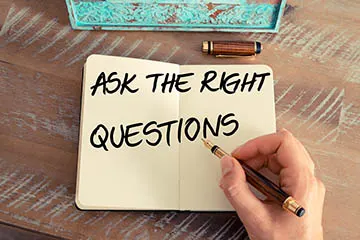Building Trust with Customers: Differentiating Between Needs vs Wants

By Ibby Smith Stofer
It is that time of year again. The pressure to meet sales objectives looms loud and the thought of failure sends chills down our spines. The questions we ask ourselves echo in our heads with every call and visit we make:
“How can I get this deal unstuck and achieve my goals?”
“Why aren’t they just moving forward?”
“They know it is a good deal and they want the equipment, but they just can’t seem to make the commitment.”
This sounds all too familiar for many of us. We continually review the next steps and we seek to find a new way to move business along. Perhaps that new way is as simple as asking a few direct questions. If we are honest with ourselves, we often have designated the deal as done, when in fact our customer is only on third base at best, not ready to round the corner to home base for us.
In our self-talk one word that stands out to me is they “want”. But is want enough? Is it enough to get the customer to take action? As a sales representative, you want your customers to like you, to rely on you, and to trust you. Trust may be the most important of the three things mentioned. It is also the hardest to earn. They may like you, and they may even “want” your products but do they trust you? Are they willing to sit down and answer the question of what is holding them back frankly and honestly? If not, you have not earned their trust.
It is important that the potential customer must need our product and or service. Have you given them the answer that their superiors are likely asking them? Put yourself in the shoes of the CFO or any other final decision maker. It is understandable that there is a need, but does it achieve any of their (not your) strategic initiatives? Will it reduce costs? Will it improve processes? Will it increase customer demand and or satisfaction?
It is not enough for the need to exist any longer. In the economic climate most businesses are facing today, there must be a verifiable alignment with the customers goals or initiatives. Simply saying that “it does” will not suffice. You and your company must be prepared to demonstrate how the use of your product or service will help them achieve their goals. It is imperative that you as a sales person understand these goals and are able to speak to them as fluently as you discuss your features, benefits, and competitive advantages.
Think about your personal needs. They could be anything from a new car, a home or a new technology gadget. So, in this case you as the customer have identified the need, a new car. After doing some online research you go shopping the old fashion way. You decide that you want to get your hands on the steering wheel and drive one for yourself. You are face to face with a sales person who now knows what you want and perhaps if they are astute has uncovered your needs. We want a new car, but why do we need a new car? Let’s say that your current car has repair issues and that the cost of gas in your area has recently increased and you can’t foresee an increase in your income coming soon, nor do you have cash set aside for those needed repairs.

You know what your needs are but are you going to offer those reasons to the person you met 30 minutes ago? Probably not. You may get into a discussion of features and take a car for a spin. Finance options, miles per gallon, warranty and trade in value of your current car are often part of that discussion as well. Too often the sales rep wants you to commit without knowing your true needs. Being moved up the line to a supervisor or manager does nothing to close the sale, until your needs have been identified.
Now imagine that same meeting with someone who uses exploratory questions to understand the real reason you are shopping and why you are at his dealership. It might go something like this:
- What do you think of the recent significant tax increase on gasoline in our state?
- Have you done much research on this model before you came out?
- What did you find that was most compelling?
- Do you know what you spent on repairs over the last 2 years? Do you perform your own service and maintenance?
- If I could put together a package for a model that included a 5 year end to end warranty, an above blue book trade value, a 60 month zero percent financing, and a 25+ miles per gallon car would you want to take that one for a drive too?
Uncovering customer needs will often be the foundation of a solid sale and perhaps, a long-lasting business relationship. Not every product or service sale requires extensive questioning. However, if using them would help you to meet the unexpressed needs or concerns you may find that things will move forward. Not understanding them could result in a competitive win, a no decision, or a continued delay.
So as you face the upcoming end of the year or quarter, ask yourself if you have uncovered the key concerns, issues and or roadblocks that your customer may still have. It could make a significant difference in your results. Remember that this is solid advice for each and every sales opportunity. It is not just a year end event. Make it a significant step in building trust and closing sales. Best of luck!
